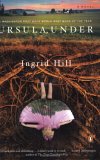Reading Guide Questions

Please be aware that this discussion guide will contain spoilers!
"Why are they wasting all that
money and energy on a goddamn half-breed trailer-trash kid?"
This question, posed in the first chapter of
Ursula, Under, spills
venomously from the lips of the inebriated Jinx Muehlenberg as her
television beams to her the unfolding story of two-and-a-half-year-old
Ursula Wong. Hours earlier, Ursula's Chinese-American father Justin and her
Finnish-American mother Annie watched in disbelief as she disappeared down
an abandoned mine shaft. Now, as Ursula lies silent beneath the earth, the
reader is given an elaborate answer to Jinx's unfeeling query. We learn to
care about Ursula, not merely because she is young, innocent, and beloved by
her parents, but because her life is the culmination of an astonishing
genealogy, dating back to ancient China and Finland.
In a series of stories, interspersed with the details of Ursula's
attempted rescue, we discover that her ancestors have endured against
impossible odds and that their combined legacy is now encapsulated within
the tiny body trapped in the mine—a body made precious by heredity and
history.
Like Ursula herself, the stories of these ancestors lie buried and
silent. They are unknown even to Annie and Justin as they anxiously await
word of their daughter's fate. However, through the panoramic vision and
striking prose of Ingrid Hill, these stories rise one by one above the
surface. They tell of a brilliantly improbable collection of characters: a
philosophical Chinese alchemist desperate to produce an heir; a Finnish
maiden saved by her deafness from blood sacrifice; the young playmate of a
Swedish princess; an irresponsible abalone fisherman; a mining supervisor
who himself perished in a mining accident; and a host of others. Alternating
between tales of relatives long dead and stories of the struggles of those
still living, Hill revives memories and resurrects lost dreams and expired
passions. She writes unflinchingly of disasters and tenderly of triumphs.
"All back story is also story," Hill advises the reader early on, and she
proceeds to prove it, illustrating that, out of the purest randomness of
human association, unique miracles are persistently born. If it is Ingrid
Hill's principal goal to convince us that little Ursula Wong is such a
miracle, it is also part of her project to show that each of us is a bit
miraculous as well.
And yet, standing at the periphery of all these marvels, like a bad fairy
in a child's nursery tale, is the malignant presence of Jinx Muehlenberg,
whose role in the lives of the Wong family is persistent and unreasoningly
evil. As Jinx casually spews racist condemnations at her television and as
Justin and Annie wonder if they will ever see their child again, the reader
becomes aware that a third delicate excavation is taking place within these
pages.
Ursula, Under is not only about liberating a little girl from
a dark hole and retrieving the past from lapsed memory; it is also about the
ceaseless struggle to extract moments of goodness and purity from a world of
tragedy.
- Although Ingrid Hill sets much of Ursula, Under in distant
historical times, she writes almost all of the novel in the present tense.
How might this choice affect the reader's response to her narrative?
- Many of the figures in the historical chapters of Ursula, Under
are potentially rich enough to be the heroes of their own separate novels.
Which of these characters do you think would be the best subject for a
complete book, and why?
- A sparkling scene takes place in "The Minister of Maps" when Ming Tao
challenges Father Josserand to explain the mysteries of Christianity to
her. Although the scene illustrates the depth of Josserand's humor and
humanity, it also reveals his willingness to entertain blasphemous ideas.
What are the most important questions raised about religion, and about
Josserand's character, in this story?
- Ursula, Under is a book laden with seemingly senseless
catastrophes. A priest is murdered in his sleep for having performed a
baptism. Children are trampled to death at a Christmas party. Annie is
crippled by a hit-and-run driver. A pregnant woman drowns in a frozen
pond. Does Hill appear to find moral or cosmic significance in suffering?
If so, what is that significance?
- The sexual pairings and circumstances by which the bloodlines are
carried forward in this novel often anything but conventional. There is a
general scarcity of long, happy, monogamous unions. What does the unusual
quality of the relationships contribute to Hill's novel?
- The historical chapters of Ursula, Under are frequently
concerned with the struggles of women to achieve control and dignity in
their lives despite social forces that, left unchallenged, would render
them passive and dependent. Can Ursula, Under be classified as a feminist
novel, and, if so, what are the features of Hill's idea of feminism?
- Ingrid Hill frequently reminds us of the many things that her
characters do not know; she comments repeatedly on their inability to
remember the past and the impossibility of foreseeing the future. Why do
you think she chose to place such powerful emphasis on states of not
knowing?
- In some ways, Ursula, Under can be thought of as a protracted
response to Jinx Muehlenberg's question, "Why are they wasting all that
money and energy on a goddamn half-breed trailer-trash kid?" How
successfully does the novel respond to that question? Are the stories
submerged in a person's hereditary past a persuasive reason for caring
about that person? Are we truly willing to embrace the premise that every
person is, as Hill says with reference to Ursula, "priceless . . . to the
planet"?
Unless otherwise stated, this discussion guide is reprinted with the permission of Penguin.
Any page references refer to a USA edition of the book, usually the trade paperback version, and may vary in other editions.

 Book Reviewed by:
Book Reviewed by:



